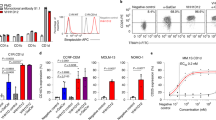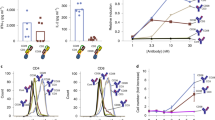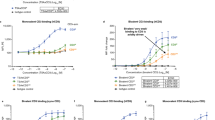Abstract
We have previously reported that r28M, a recombinant bispecific single-chain antibody directed to a melanoma-associated proteoglycan (NG2) and the costimulatory CD28 molecule on T cells, induced T-cell activation, which resulted in tumor-cell killing. T-cell activation did not require a primary signal through the T-cell antigen receptor (TCR)/CD3 complex and depended on the presence of NG2-positive tumor cells. Here, we further investigate this phenomenon of a target cell-restricted, supra-agonistic CD28 stimulation with bispecific antibodies. To this end, we exchanged the NG2 targeting part of r28M with a single-chain antibody directed to the B-cell associated antigen CD20. The resulting bispecific single-chain antibody, termed r2820, induced supra-agonistic T-cell activation, which required the presence of autologous normal or malignant B cells, respectively. Once activated, T cells were capable of destroying lymphoma target cells.
These findings demonstrate that supra-agonistic CD28 stimulation with bispecific single-chain antibodies is a robust and readily reproducible phenomenon. In the context of experimental tumor therapy, it may provide a valuable alternative to the unrestricted T-cell activation induced by ‘super-agonistic’, monospecific CD28 antibodies.
This is a preview of subscription content, access via your institution
Access options
Subscribe to this journal
Receive 12 print issues and online access
$259.00 per year
only $21.58 per issue
Buy this article
- Purchase on Springer Link
- Instant access to full article PDF
Prices may be subject to local taxes which are calculated during checkout





Similar content being viewed by others
Accession codes
References
Zang X, Allison JP . The B7 family and cancer therapy: costimulation and coinhibition. Clin Cancer Res 2007; 13 (18 Part 1): 5271–5279.
Tacke M, Hanke G, Hanke T, Hunig T . CD28-mediated induction of proliferation in resting T cells in vitro and in vivo without engagement of the T cell receptor: evidence for functionally distinct forms of CD28. Eur J Immunol 1997; 27: 239–247.
Elflein K, Rodriguez-Palmero M, Kerkau T, Hunig T . Rapid recovery from T lymphopenia by CD28 superagonist therapy. Blood 2003; 102: 1764–1770.
Beyersdorf N, Hanke T, Kerkau T, Hunig T . Superagonistic anti-CD28 antibodies: potent activators of regulatory T cells for the therapy of autoimmune diseases. Ann Rheum Dis 2005; 64 (Suppl 4): iv91–iv95.
Suntharalingam G, Perry MR, Ward S, Brett SJ, Castello-Cortes A, Brunner MD et al. Cytokine storm in a phase 1 trial of the anti-CD28 monoclonal antibody TGN1412. N Engl J Med 2006; 355: 1018–1028.
Grosse-Hovest L, Hartlapp I, Marwan W, Brem G, Rammensee HG, Jung G . A recombinant bispecific single-chain antibody induces targeted, supra-agonistic CD28-stimulation and tumor cell killing. Eur J Immunol 2003; 33: 1334–1340.
Grosse-Hovest L, Muller S, Minoia R, Wolf E, Zakhartchenko V, Wenigerkind H et al. Cloned transgenic farm animals produce a bispecific antibody for T cell-mediated tumor cell killing. Proc Natl Acad Sci USA 2004; 101: 6858–6863.
Grosse-Hovest L, Wick W, Minoia R, Weller M, Rammensee HG, Brem G et al. Supraagonistic, bispecific single-chain antibody purified from the serum of cloned, transgenic cows induces T-cell-mediated killing of glioblastoma cells in vitro and in vivo. Int J Cancer 2005; 117: 1060–1064.
Liu AY, Robinson RR, Murray Jr ED, Ledbetter JA, Hellstrom I, Hellstrom KE . Production of a mouse-human chimeric monoclonal antibody to CD20 with potent Fc-dependent biologic activity. J Immunol 1987; 139: 3521–3526.
Jung G, Freimann U, Von Marschall Z, Reisfeld RA, Wilmanns W . Target cell-induced T cell activation with bi- and trispecific antibody fragments. Eur J Immunol 1991; 21: 2431–2435.
Cemerlic D, Dadey B, Han T, Vaickus L . Cytokine influence on killing of fresh chronic lymphocytic leukemia cells by human leukocytes. Blood 1991; 77: 2707–2715.
Rossi E, Matutes E, Morilla R, Owusu-Ankomah K, Heffernan AM, Catovsky D . Zeta chain and CD28 are poorly expressed on T lymphocytes from chronic lymphocytic leukemia. Leukemia 1996; 10: 494–497.
Frydecka I, Kosmaczewska A, Bocko D, Ciszak L, Wolowiec D, Kuliczkowski K et al. Alterations of the expression of T-cell-related costimulatory CD28 and downregulatory CD152 (CTLA-4) molecules in patients with B-cell chronic lymphocytic leukaemia. Br J Cancer 2004; 90: 2042–2048.
Tacke M, Hanke G, Hanke T, Hunig T . CD28-mediated induction of proliferation in resting T cells in vitro and in vivo without engagement of the T cell receptor: evidence for functionally distinct forms of CD28. Eur J Immunol 1997; 27: 239–247.
Kunicka JE, Platsoucas CD . Defective helper function of purified T4 cells and excessive suppressor activity of purified T8 cells in patients with B-cell chronic lymphocytic leukemia. T4 suppressor effector cells are present in certain patients. Blood 1988; 71: 1551–1560.
Foon KA, Rai KR, Gale RP . Chronic lymphocytic leukemia: new insights into biology and therapy. Ann Intern Med 1990; 113: 525–539.
Platsoucas CD, Galinski M, Kempin S, Reich L, Clarkson B, Good RA . Abnormal T lymphocyte subpopulations in patients with B cell chronic lymphocytic leukemia: an analysis by monoclonal antibodies. J Immunol 1982; 129: 2305–2312.
Totterman TH, Carlsson M, Simonsson B, Bengtsson M, Nilsson K . T-cell activation and subset patterns are altered in B-CLL and correlate with the stage of the disease. Blood 1989; 74: 786–792.
Brandl M, Grosse-Hovest L, Holler E, Kolb HJ, Jung G . Bispecific antibody fragments with CD20 × CD28 specificity allow effective autologous and allogeneic T-cell activation against malignant cells in peripheral blood and bone marrow cultures from patients with B-cell lineage leukemia and lymphoma. Exp Hematol 1999; 27: 1264–1270.
Acknowledgements
We thank Dr Helmut R Salih, Medical Department II, University of Tübingen, for providing blood samples of CLL patients. This work was supported by grants from the Stiftung Deutsche Krebshilfe (Nr. 106769) and from the Deutsche Forschungsgemeinschaft (SFB773).
Author information
Authors and Affiliations
Corresponding author
Rights and permissions
About this article
Cite this article
Otz, T., Große-Hovest, L., Hofmann, M. et al. A bispecific single-chain antibody that mediates target cell-restricted, supra-agonistic CD28 stimulation and killing of lymphoma cells. Leukemia 23, 71–77 (2009). https://doi.org/10.1038/leu.2008.271
Received:
Revised:
Accepted:
Published:
Issue Date:
DOI: https://doi.org/10.1038/leu.2008.271
Keywords
This article is cited by
-
Expanding the Boundaries of Biotherapeutics with Bispecific Antibodies
BioDrugs (2018)
-
A semi high-throughput method for screening small bispecific antibodies with high cytotoxicity
Scientific Reports (2017)
-
Characterization of a Bispecific FLT3 X CD3 Antibody in an Improved, Recombinant Format for the Treatment of Leukemia
Molecular Therapy (2015)
-
Targeted cancer immunotherapy via combination of designer bispecific antibody and novel gene-engineered T cells
Journal of Translational Medicine (2014)
-
Multi-Specific Antibodies for Cancer Immunotherapy
BioDrugs (2014)



